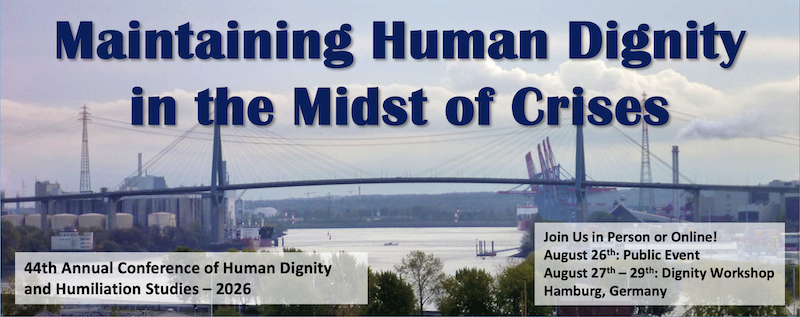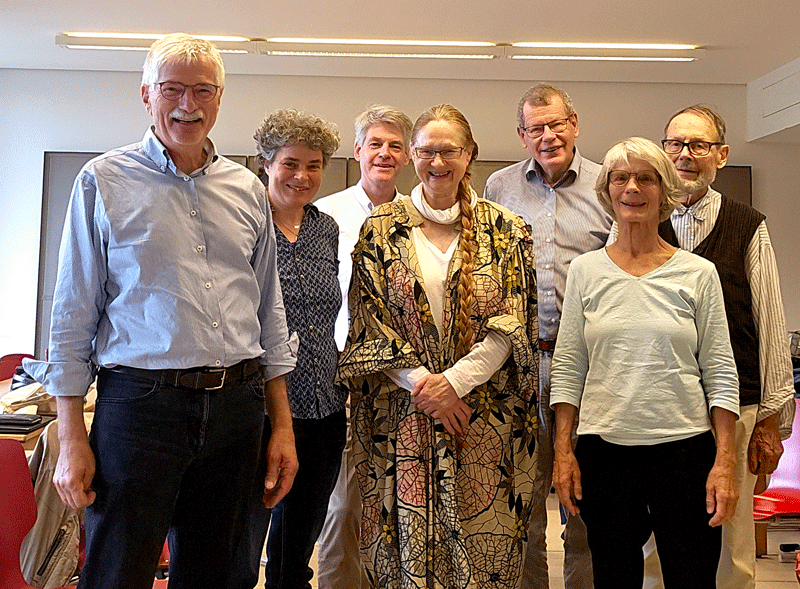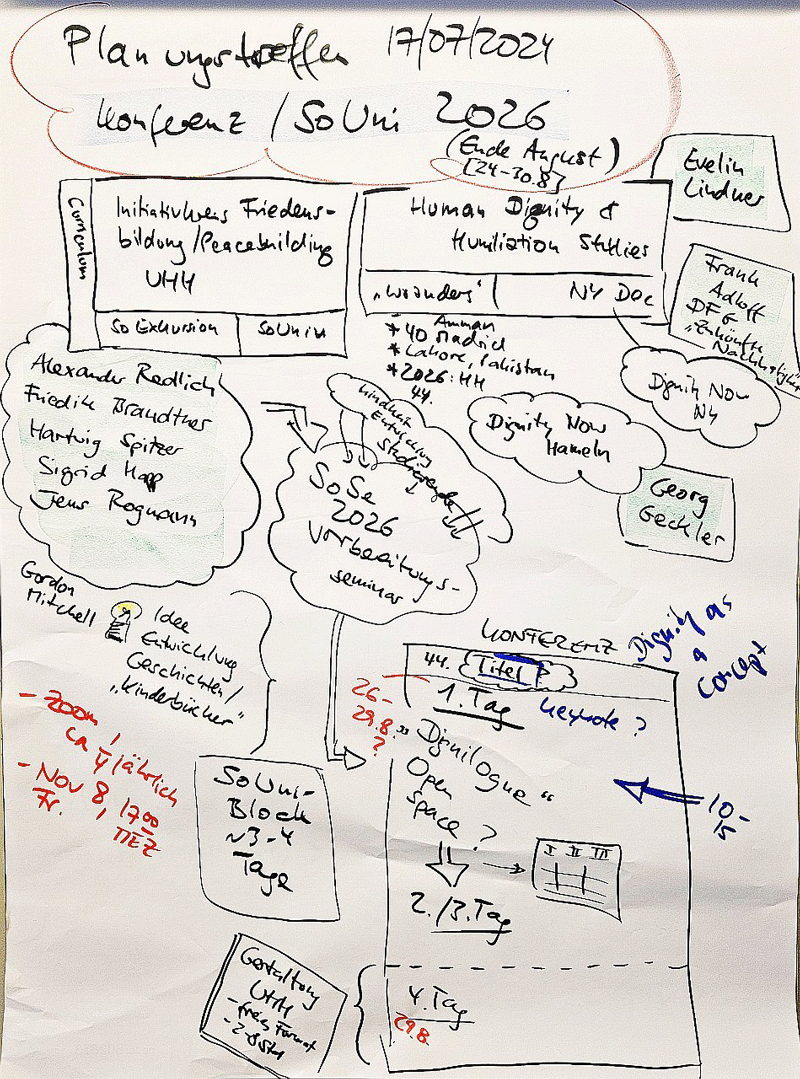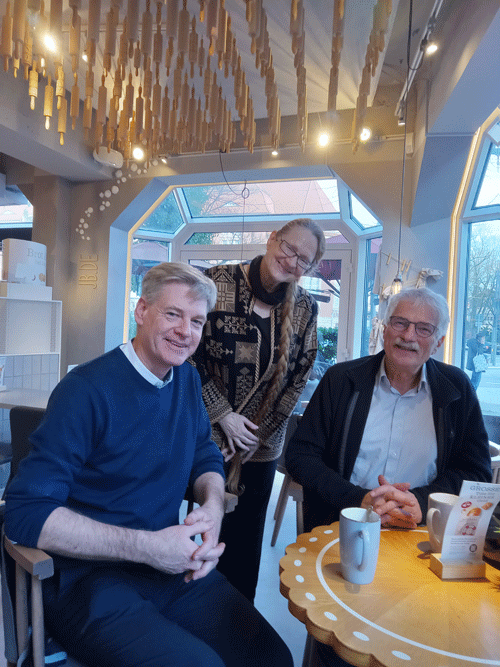44th Annual Conference of Human Dignity and Humiliation Studies
'Maintaining Human Dignity in the Midst of Crises'
in Hamburg, Germany
and online
26th – 29th August 2026
26th August: Public Event /
27th – 29th August 2026: Dignity Workshop
including two 'Global Village' sessions
and
excursions to interesting places in Hamburg
Please visit this webpage regularly for the latest information, as plans for this conference
unfold
The Dignity Conference in Hamburg in August 2026 will be linked to the annual summer school of the trans-disciplinary "Peace Education/Peacebuilding" initiative at the University of Hamburg. Both teachers and students from the University will partake in the conference. In the summer semester 2026 immediatly preceding the conference, students of the "Peace Education/Peacebuilding" curriculum will develop stories or other arts-based activities for (and with) children and young people that address a constructive overcoming of humiliating experiences in childhood and adolescence. These students will share their results with other participants of the HDHS conference in the usual open space format.
If you wish to participate, please email us! Please know that you are invited to spend the entire conference with us, so that true dignity-family-building can emerge! All our events are part of an ongoing effort to nurture a global dignity community.
You are invited to fill out our Appreciative Introduction form, print it out, and bring it with you.
There is no registration fee, we share minimal cost according to ability at the end.
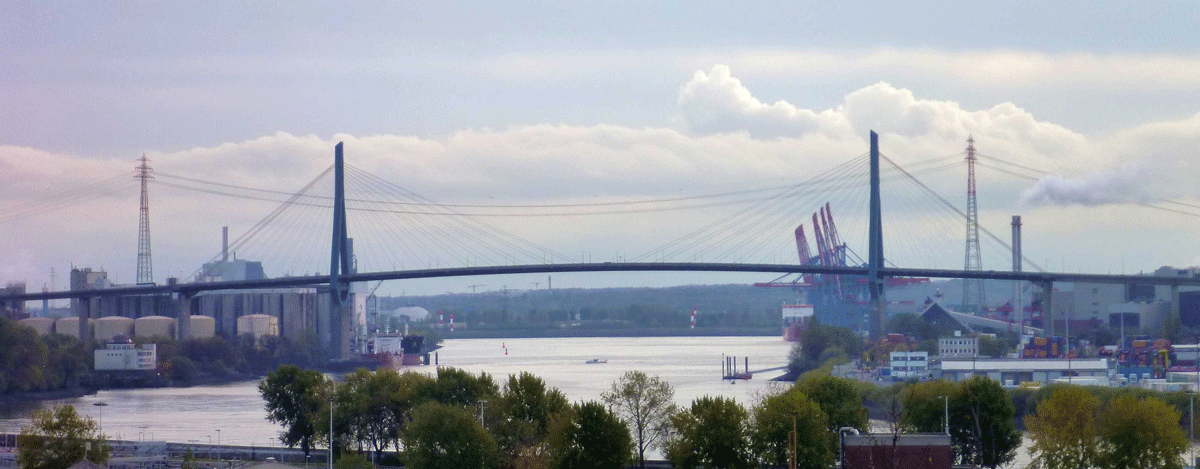
Köhlbrandtbrücke
In preparation for attending this workshop, all participants were invited to make themselves familiar with
the Appreciative Enquiry Frame that we use in our work
See an introduction created by Linda Hartling
All participants were furthermore kindly asked to learn about our
Dignilogue (Dignity + Dialogue) Approach
Our conferences usually have two parts, a workshop part and a public part
(please be aware that this site will always change and evolve, until after the conference)
1. Workshop with Dignilogues
Three days, 09:00 am to 07:00 pm
Venue: University of Hamburg, Von Melle Park 8
2. Public Event
Venue: University of Hamburg, Von Melle Park 8
Post-Conference Activities for those Interested
Hosts, Conveners, and Coordinators
Friedensbildung-Peacebuilding
University of HamburgThe conference is convened and organised by Alexander Redlich and the Friedensbildung-Peacebuilding group
of the International Summer School at the University of Hamburg in 2026
in cooperation with the
World Dignity University initiative
• Registration is free. If you wish to participate in our conferences, please send us an email. Please know that you are invited to spend the entire conference with us, so that true dignity-family-building can emerge! All of our events are part of an ongoing effort to nurture a global dignity community.
• Thank you for emailing your message and introductory information to conferences@humiliationstudies.org. Please kindly include your contact information and any other details you would like to share with our community (such as CV, papers, articles, presentations, video links, etc.).
• There is no registration fee for our conferences. To cover our expenses, we always summarise the costs during the conference and invite participants to contribute according to their ability. This collaborative approach to financing allows us to keep the conference affordable for all.
• You are invited to fill out our Appreciative Introduction form (Word/PDF), print it out, and bring it with you.
• We gratefully count on you to obtain your own tourist visum and make your own transportation and accommodation arrangements. Please see options further down.
• As soon as it is ready, you will see here your programme of the entire conference for you to print out, in English and in Spanish.
• Have a look at all our previous conferences and see also the Newsletters written after our past conferences.
• How to get to the conference venue
Please obtain your own private tourist visa. Please travel to Hamburg in Germany.
Our conference venue is the University in Hamburg, Germany.
• Where to stay
We thank all participants in our conferences for being fully responsible for bearing the cost of their own travel, transportation, and accommodation arrangements. Please arrange to stay in the accommodation of your choice. Remember that the conference venue is University of Hamburg, Von Melle Park 8. Here are some suggestions:
• The University of Hamburg's official hotel recommendations for guests
Other suggestions:
• St. Ansgar-Haus (price list)
• Motel One Hamburg-Alster
• Jugendherbergen in Hamburg
• Furthermore, we always kindly ask local participants who reside in close proximity of the conference venue to lend a helping hand to those traveling from afar, which also helps us keep our events collaborative and affordable for all.
• Where to eat
On or near the Von-Melle-Park Campus of the University of Hamburg, there are several options:
• Mensa Studierendenhaus: This is the largest cafeteria of the Studentenwerk, with 600 seats. It offers up to eight different dishes daily, including a large salad bar and a pasta station. The cafeteria is located at Von-Melle-Park 2.
• Mensa Philosophenturm: This cafeteria offers an innovative menu with a focus on Levantine and Asian wok cuisine. There's a wide selection of vegetarian and vegan dishes, as well as two salad stations.
• Schlüters (Pizza & More): Located right next to the Mensa Studierendenhaus, Schlüters offers freshly prepared pizzas and drinks. The area is barrier-free and includes high chairs for children.
• Café dell’ Arte: Although not directly listed, Café dell’ Arte is nearby and offers snacks and small meals.
• For additional options outside the campus but nearby, restaurants like the Abaton Bistro, the Restaurant Gran Sasso or Arkadasch might be interesting. They are located in the Grindelhof area.
• Pre- and Post-conference experiences
• Landungsbrücken (Port of Hamburg)
• Elbphilharmonie Hamburg
• Hamburg State Opera
• FABRIK Hamburg
• Rote Flora
• Kampnagel
• Dachgarten, Grüner Bunker Feldstrasse
• Zero Emissions Buildings
• Innovative architectural projects aimed at supporting socially vulnerable segments of society
• Please kindly note that...
• There is no registration fee for our conferences. To cover our expenses, we always summarise the costs during the conference and invite participants to contribute according to their ability. This collaborative approach to financing allows us to keep the conference affordable for all.
• We like to get to know participants prior to our conferences and workshops, and prior to issuing an invitation.
• All our gatherings are by invitation only, please approach us so that we can include you and register you.
Only our Public Events are open to everybody without registration.
• The Non-Public Parts of our gatherings have limited enrollment.
• Participants are encouraged to find their own sources of funding or economic support to participate in our conferences. We offer our nurturing work as our gift of love and care to you, and we
would like to lovingly invite everybody to contribute to this gift economy. If you need funding for your travels and housing, please use the invitation letter we send you and inquire in your country and your university about possibilities. See, among others, for the U.S., www.supportcenteronline.org and www.foundationscenter.org. The Weinstein International Fellowship program, inaugurated in 2008, provides opportunities for individuals from outside the United States to visit the U.S. to learn more about dispute resolution processes and practices and to pursue a project of their own design that serves to advance the resolution of disputes in their home countries.
• Participants in our conferences are kindly asked to handle all of their travel arrangements and required documentation, including requests for visas, on their side. HumanDHS is a volunteer initiative and does not have the staff or resources to assist with visa requests.
• Permissions
During our conferences, we always ask all participants for their permission to have their pictures or videos posted on our website, however, if you change your mind later, either in total or for specific pictures/videos, please let us know! Thank you! Since we wish to walk the talk of dignity, it is very important for us to do our utmost in respecting everybody's privacy. We refrain from gathering written permissions from participants during our conferences since we value the creation of mutual trust in relationships and would like to refrain from contributing to an ever more bureaucratic and legalistic society.
• Green conference and reinventing organization
We strive to organise our conferences as "Green Conferences". Lynn King kindly advises us. We also thank Vegard Jordanger for making us aware of Frederic Laloux's work on Reinventing Organizations (2014).
• What happened in our previous conferences?
Please have a look at all our previous conferences and the newsletters written after these conferences.
• Frame
• List of Conveners
• Programme
• List of Participants
• Papers
• Background Material
• Previous Reflections on the Format of the Conference
• What happened in our previous meetings? Please see Newsletters!
Frame
by Linda Hartling, 2004
In our meetings we aim at creating a humiliation-free, collaborative learning environment characterised by mutual respect, mutual empathy, and openness to difference. The perspective of 'appreciative enquiry' is a useful frame of our work. Our HumanDHS efforts are not just about the work we do together, but also about HOW WE WORK TOGETHER. At appropriate points during our meetings, for example at the end of each day, we take a moment to reflect on the practices observed that contributed to an appreciative/humiliation-free learning experience.
It is important to emphasise that an appreciative approach is not about expecting people to agree. In fact, differences of opinion enrich the conversation and deepen people's understanding of ideas. Perhaps, this could be conceptualised as 'waging good conflict' (Jean Baker Miller), which means practicing radical respect for differences and being open to a variety of perspectives and engaging others without contempt or rankism. As we have seen in many fields, contempt and rankism drain energy away from the important work that needs to be done. Most people only know 'conflict' as a form of war within a win/lose frame. 'Waging good conflict', on the other side, is about being empathic and respectful, making room for authenticity, creating clarity, and growth.
Please see:
• An Appreciative Frame: Beginning a Dialogue on Human Dignity and Humiliation, written by Linda in 2005
• Appreciative Facilitation: Hints for Round Table Moderators, kindly written in February 2006 by Judith Thompson to support the moderators of our workshops.
• Buddhist Teachings on Right Speech, kindly provided to us by Thomas Daffern in 2006, relating to our quest for appreciative enquiry, caring and being.
• Dignilogue Tips and Dynamic Dignilogue List, created by Linda Hartling on October 10, 2015, for the 2015 Workshop on Transforming Humiliation and Violent Conflict, in New York City, December 3 – 4, 2015.
• Appreciative Enquiry 1, a video that was recorded on October 30, 2011, in Portland, Oregon, USA, by Evelin Lindner, for the World Dignity University initiative.
• Please see further down more introductory videos on our Appreciative Frame created by Linda Hartling.
List of Conveners
Evelin Gerda Lindner, Medical Doctor, Clinical and Social Psychologist, Ph.D. (Dr. med.), Ph.D. (Dr. psychol.), Organiser of the HumanDHS Conferences, Supporting the Local Conveners
Evelin Gerda Lindner is the Founding President of the Human Dignity and Humiliation Studies (HumanDHS) network and initiator of the World Dignity University initiative. She is a transdisciplinary social scientist and humanist who holds two Ph.D.s, one in medicine and one in psychology. In 1996, she designed a research project on the concept of humiliation and its role in genocide and war. German history served as starting point. She is the recipient of the 2006 SBAP Award, the 2009 "Prisoner’s Testament" Peace Award, the 2014 HumanDHS Lifetime Award, and she has been nominated for the Nobel Peace Prize in 2015, 2016, and 2017. She is affiliated with the University of Oslo, Norway, with its Department of Psychology since 1997, periodically also with its Center for Gender Research and with its Norwegian Centre for Human Rights, furthermore, with Columbia University in New York since 2001, first with its Conflict Resolution Network (CU-CRN), which in 2009 was superseded by the Advanced Consortium on Cooperation, Conflict, and Complexity (AC4). She is also affiliated with the Maison des Sciences de l'Homme in Paris since 2001. Lindner is teaching globally, including in South East Asia, the Middle East, Australia, Africa, and other places globally. [read more]
Please see:
• Interview with Evelin Lindner - Challenges of our Time; Learning to Connect, December 8, 2016
• Mini-Documentary of the Annual Human Dignity and Humiliation Studies Workshop on Transforming Humiliation and Violent Conflict "The Globalization of Dignity," December 8 - 9, 2016
Linda Hartling, Ph.D., Social Psychologist, Organiser of the HumanDHS Conferences, Supporting the Local Conveners
Linda M. Hartling, Ph.D., is the recipient of the 2015 Human Dignity (Half!) Lifetime Commitment Award.
She is the Director of Human Dignity and Humiliation Studies (HumanDHS) and contributes to the leadership and development of workshops, conferences, Dignity Press publications, and the World Dignity University initiative. She works in daily collaboration with HumanDHS Founding President Evelin Lindner and is the key creator of the Dignity Letter. She is also a member of the HumanDHS Global Advisory Board, HumanDHS Global Core Team, HumanDHS Global Coordinating Team, HumanDHS Research Team, and HumanDHS Education Team.
Linda Hartling's husband Richard Slaven, formerly Brandeis University, Massachusetts, U.S.A., is the Director of HumanDHS Dignifunding. Richard Slaven is a Member of the Board of Directors of HumanDHS, he is a member of the HumanDHS Global Advisory Board and a Member of the HumanDHS Planning Committee. He is the recipient of the 2014 HumanDHS Lifetime Commitment Award.
Prior to the founding of HumanDHS, Linda Hartling was the Associate Director the Jean Baker Miller Training Institute (JBMTI) at the Stone Center, which was part of the Wellesley Centers for Women at Wellesley College in Massachusetts. She worked closely with Jean Baker Miller, MD, and other colleagues on the development of Relational-Cultural Theory. She holds a doctoral degree in clinical/community psychology and she developed the first scale to assess the internal experience of humiliation in 1996, which has been translated into many languages. In addition, she has published papers and chapters on resilience, substance abuse prevention, shame and humiliation, relational practice in the workplace, and Relational-Cultural Theory. [read more]
Linda Hartling kindly co-edited this book, wrote the Foreword and the final chapter:
"Moving Beyond Humiliation: A Relational Conceptualization of Human Rights." In Human Dignity: Practices, Discourses, and Transformations: Essays on Dignity Studies in Honor of Evelin G. Lindner. Edited by Chipamong Chowdhury, Michael Britton, and Linda Hartling. Chapter 15. Lake Oswego, OR: Dignity Press, 2019
Please see also:
• Humiliation: Real Pain, A Pathway to Violence, the draft of Linda's paper for Round Table 2 of our 2005 Workshop on Humiliation and Violent Conflict, Columbia University, New York City
• Humiliation: Assessing the Impact of Derision, Degradation, and Debasement, first published in The Journal of Primary Prevention, 19(4): 259-278, co-authored with T. Luchetta, 1999
• Shame and Humiliation: From Isolation to Relational Transformation, the Jean Baker Miller Training Institute (JBMIT), Wellesley Centers for Women, Wellesley College No. 88, Wellesley, MA 02481, co-authored with Wendy Rosen, Maureen Walker, Judith V. Jordan, 2000.
• Humiliation and Assistance: Telling the Truth About Power, Telling a New Story, paper prepared for the 5th Annual Conference of Human Dignity and Humiliation Studies 'Beyond Humiliation: Encouraging Human Dignity in the Lives and Work of All People', in Berlin, 15th -17th September, 2005
• Dignilogue Tips and Dynamic Dignilogue List, created on October 10, 2015, for the 2015 Workshop on Transforming Humiliation and Violent Conflict, in New York City, December 3 – 4, 2015
• Mini-Documentary of the Annual Human Dignity and Humiliation Studies Workshop on Transforming Humiliation and Violent Conflict "The Globalization of Dignity," December 8 - 9, 2016
See also Linda Hartling's introductions to the Appreciative Frame that we use in our work.
[read more]
Workshop Programme (still evolving!)
Day One (still evolving!)
Venue: ...
• Registration
• Welcome by the host, convener, and organiser of this conference, Shahid Khan
• Welcome by Evelin Lindner to the workshop part of this conference
• Participants present themselves
• Musical presentation
• Latest News
• Introductory presentation: Who We Are: Our Global Dignity Family
Evelin G. Lindner, Founding President of HumanDHS
• Introductory presentation: Appreciative Frame of the conference, explained by Linda Hartling
Linda M. Hartling, Ph.D., Director of HumanDHS. Linda is also affiliated with the Jean Baker Miller Training Institute (JBMTI) at the Stone Center, which is part of the Wellesley Centers for Women at Wellesley College in Massachusetts. Until 2008, she was its Associate Director.
In our conferences, we aim at creating a humiliation-free, collaborative learning environment characterised by mutual respect, mutual empathy, and openness to difference. The perspective of 'appreciative enquiry' is a useful frame of our work. Our HumanDHS efforts are not just about the work we do together, but also about HOW WE WORK TOGETHER. At appropriate points during our conferences, for example at the end of each day, we take a moment to reflect on the practices observed that contributed to an appreciative/humiliation-free learning experience.
Please read An Appreciative Frame: Beginning a Dialogue on Human Dignity and Humiliation, that Linda has written for us in 2005.
Also created by Linda M. Hartling:
• Appreciative Frame, recorded for the 2024 Annual Conference of Human Dignity and Humiliation Studies in Madrid, on October 25, 2024, in Portland, Oregon
• Appreciative Frame, recorded on November 21, 2023, in Portland, Oregon, USA, for our 2023 New York Workshop
• Appreciative Frame, recorded on August 23, 2022, in Portland, Oregon, USA, for the 37th Annual Conference of Human Dignity and Humiliation Studies, in Amman, Jordan, 5th – 7th September 2022.
• Appreciative Frame, recorded on 9th December 2021, for our 2021 Workshop on Transforming Humiliation and Violent Conflict
• Appreciative Frame, recorded on 10th December 2020, for our 2020 Workshop on Transforming Humiliation and Violent Conflict
• Appreciative Frame, recorded on 5th December 2019, for our 2019 Workshop on Transforming Humiliation and Violent Conflict
• Appreciative Frame, by Linda Hartling on December 8, 2016, at the 2016 Workshop on Transforming Humiliation and Violent Conflict, in New York City, December 8 – 9, 2016.
• Appreciative Enquiry 4, a video that was recorded on May 27, 2015, in Portland, Oregon, USA, for the 25th Annual Conference of Human Dignity and Humiliation Studies, in Kigali, Rwanda, 2nd – 5th June 2015.
• Our Appreciative Frame 3, a video created in December 2014 (see also Pdf), for the 2014 Workshop on Transforming Humiliation and Violent Conflict, in New York City, December 4 – 5, 2014.
• Appreciative Enquiry 2, a video that was uploaded onto YouTube on August 11, 2012, in preparation of the 19th Annual Conference of Human Dignity and Humiliation Studies, 27th-30th August 2012, in Oslo, Norway.
• Appreciative Enquiry 1, a video that was recorded on October 30, 2011, in Portland, Oregon, USA, by Evelin Lindner, for the World Dignity University initiative.
• Lunch
• Launch of Dignilogue (Dignity + Dialogue) Sessions
Created by Linda M. Hartling:
• Introduction to the Dignity Dialogue Format, created for the 2024 Madrid Conference on 16th August 2024 in Portland, Oregon
• Introduction to the 20th Workshop on Transforming Humiliation and Violent Conflict, in New York City, December 8, 2023.
• Dignilogue Tips and Dynamic Dignilogue List, created on October 10, 2015, for the 2015 Workshop on Transforming Humiliation and Violent Conflict, in New York City, December 3 – 4, 2015.
• Dignilogue: An Introduction to Dignity + Dialogue created on 31th May 2015
• Introducing the Open Space Format to the HumanDHS Network, longer version created on 13th August 2012
• Dignilogue Tips and Dynamic Dignilogue List, created on 10th October 2015 for our 2015 New York Workshop
• Our Open Space Dignilogue Format, created on 12th August 2012 for our 2012 Norway Conference
• See also A Summary of Our Dignilogue Format created in 2010 for you to download
• An Appreciative Frame: Beginning a Dialogue on Human Dignity and Humiliation, written by Linda Hartling in 2005
See also:
• Appreciative Facilitation: Hints for Dignilogue Moderators, written by Judith Thompson in February 2006 to support the moderators of our workshops
• Buddhist Teachings on Right Speech, kindly provided to us by Thomas Daffern in 2006, relating to our quest for appreciative enquiry, caring and being
For the past decade, we have continuously worked to dignify the traditional institution "conference." The Open Space movement originally started from the observation that after mainstream academic conferences, the participants, when asked, often say: 'Oh, I slept through the presentations, but the coffee breaks were wonderful!'
'Conference programs are replete with monologues that silence all but the speaker. The vitalizing communication is typically found in the hallways, the bars, and the dinner table – the venues of informal conversation', wrote scholar Kenneth Gergen in 2009 (in his book on relational being). In other words, the motivating impetus behind the Open Space approach is that academic conference can be rather boring; invited speakers might not be in tune with the audience; and reading papers aloud may be particularly uncommunicative. The creators of the Open Space approach thought: 'Ok, why don't we create conferences that are structured like coffee breaks!' Please read more about the originator of the Open Space Technology, Harrison Owen. See also Open Space Tools by Peggy Holman.
In slight variation of traditional conferences, we therefore aim at co-creating our conferences. We have adapted the Open Space approach, added the term dialogue, and connected it with dignity to form the expression Dignilogue (see also our Video page for how peace linguist Francisco Gomes de Matos has inspired this linguistic creation).
You can see an Introduction into the Dignilogue Sessions Format created by Linda M. Hartling on 12th August 2012, for our 2012 Norway Conference, or read more about the Dignilogue format and what it entails. See also Linda's Dignilogue Tips and Dynamic Dignilogue List, created on 10th October 2015 for the 2015 Workshop on Transforming Humiliation and Violent Conflict at Columbia University in New York City.
This format is very open, it means that a conference is self-organizing. We take a highly collaborative approach to determining how to use our time.
We invite participants to be with us without the ambition to "present" something, so that we all could get a feel for the dignity-family-building work that we wish to nurture first and foremost. So, the workshop requires its participants to bring themselves as they are, be prepared for everything, and use the flow to contribute in the most nurturing way they can. As background reading you might enjoy "Are College Lectures Unfair?" by Anne Murphy Paul, The New York Times, September 12, 2015, or When Nothing Is Cool by Lisa Ruddick, Criticism, 2015.
The Dignilogue approach allows for identifying priorities for dialogue sessions on key topics.
In practice, on Day One of our conference, we, the participants, make the programme for Day Two and Day Three together, in a collaborative effort. All participants are both presenters and audience, there is no separation, there is no pre-planned programme, except for the introductory part (and the Public Event). We are aware that this approach is new to most people, yet, it opens new dimensions. We invite every participant to join in and try. It has an profoundly dignifying impact and, as our participants always tell us afterwards.
The grand finale of each Dignilogue session is to invite representatives from each Dignilogue to create a Dignivideo, where they document the highlights of their conversation and insights, and more than that, formulate a "message to the world" as it has cristallized in the dignilogue. These videos are treasured contributions to our World Dignity University Library of Ideas that will be shared with the world and will inspire future generations of our community. Please read about the way we work in our newsletter10.
There are two main ways to conduct our WDU videos:
1. Each group can choose two representatives (usually the initiator chooses one participant in the group) and they engage in a short dialogue (example). Advantage: the message may be clearer.
2. The entire group can stand in front of the camera (example). Advantage: everybody is being included.
Evelin Lindner explained the procedure of the 'Messages to the World' for the World Dignity University Initiative for the Dignity Conference in Cairo, Egypt, on 21st September 2018 (see video).
We always encourage all participants of our events to nurture mutually dignifying connections with the other participants and gather together afterwards to experiment with new forms of "conferencing" wherever you live in the world. New solutions are necessary and they need to be nurtured in dignified ways, ways which protect them from being destroyed by being framed in old paradigms (such as those of protest that simply ends in new dominators taking over). See our reflections on appreciative nurturing, or Charles Eisenstein's Reflections on the New Story Summit, or Evelin's text Is it Possible to "Change the World"? Some Guidelines to How We Can Build a More Decent and Dignified World Effectively: The Case of Dignifying Abusers.
As mentioned above, the Dignilogue approach means developing the programme of the conference on the first day.
The following dignilogue topics are being proposed during the two-years preparation period for the conference:
End of Day One
Day Two (still evolving!)
Venue: ...
Welcome
Continuation of Dignilogue Sessions
End of Day Two
Day Three (still evolving!)
Venue: ...
Welcome
Continuation of Dignilogue Sessions
End of Day Three
Public Event
Everybody who is interested is always invited to our Public Events, entrance is free, our work is a labor of love and we offer it as a gift!
• Registration
• Musical presentation
• Welcoming everybody to the public event of our conference
• Welcome to the Public Event of this conference by the hosts, conveners, and organisers of this conference
• Welcome by Evelin Lindner, Founding President of the Human Dignity and Humiliation Studies network and Co-founder of the World Dignity University initiative
• xxx
The hosts of this conference present their work
• Appreciative Enquiry and Humiliation
by Linda Hartling, Ph.D., Associate Director, Jean Baker Miller Training Institute, Wellesley College, Boston, USA
In our conferences we aim at creating a humiliation-free, collaborative learning environment characterised by mutual respect, mutual empathy, and openness to difference. The perspective of 'appreciative enquiry' is a useful frame of our work. Our HumanDHS efforts are not just about the work we do together, but also about HOW WE WORK TOGETHER. At appropriate points during our conferences, for example at the end of each day, we take a moment to reflect on the practices observed that contributed to an appreciative/humiliation-free learning experience.
Please read An Appreciative Frame: Beginning a Dialogue on Human Dignity and Humiliation, that Linda has written for us in 2005.
• From Humiliation to Dignity
Evelin Lindner, Founding Director and President of HumanDHS
• Musical presentation
Closing of the event
Preparatory Meetings (in progress)
9th July 2025, Free and Hanseatic City of Hamburg and Hameln, Germany Thank you so much, dear Alexander Redlich, for gathering yet another wonderful meeting in preparation for our 2026 Dignity Conferencewith your colleagues who are all working for peace! • Kindly click on the photo above to see it larger. |
8th November 2024, Free and Hanseatic City of Hamburg and Hameln, Germany, and New York City |
17th July 2024, Universität Hamburg, VMP8 Faculty of Education University of Hamburg, Von-Melle-Park 8, Free and Hanseatic City of Hamburg, Germany Ein GROSSES Danke für dieses wundervolle Vorbereitungstreffen für unsere 2026 Dignity Konferenz in Hamburg! |
1st February 2024, Free and Hanseatic City of Hamburg, Germany |
Tentative List of Participants (in progress)
If you wish to participate, email us!
• Evelin Lindner, host, convener, and organiser of this conference
Papers
All participants are warmly invited to send in papers.
Please notify us, if you wish to submit any of your papers also as a book chapter or as a journal article.
Please see earlier submitted papers here:
• List of All Publications
Background material
• ‘Pay up or humanity will pay the price’, Guterres warns at COP29 climate summit,
12 November 2024 - UN Secretary-General António Guterres said on Tuesday that leaders gathered in Baku for the COP29 Climate Action Summit must take immediate steps to cut emissions, safeguard people from climate chaos, and “tear down the walls to climate finance” in response to the “masterclass in climate destruction” that the world has witnessed in 2024. “The sound you hear is the ticking clock. We are in the final countdown to limit global temperature rise to 1.5 degrees Celsius. And time is not on our side,” he warned. In his opening remarks to the World Leaders Climate Action Summit, the ministerial-level segment of COP29, which officially opened on Tuesday in the Azerbaijan capital of Baku, Mr. Guterres pointed to the proof, noting that 2024 is almost certain to be the hottest year ever recorded. Meanwhile, “no country is spared” from climate destruction ranging from hurricanes to boiling seas, drought ravaged crops, and more, all being supercharged by human-made climate change.
Evelin's comment:
Lahore is engulfed in toxic air pollution in November 2024. Seen through the lens of humiliation, this state of affairs could be described as triple humiliation (if not more): First, the West brought polluting vehicles, second, it brought climate change, and third, it fails to provide the help that is needed to repair the damage.
